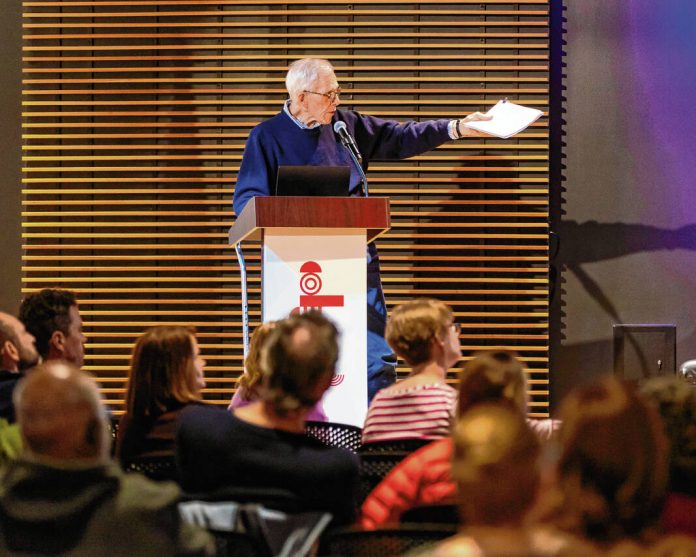
Photo by Hadley Fruits Researcher Jim Nickoll speaks during Wednesday’s Black Heritage Sites meeting at Helen Haddad Hall in Columbus.
Black business-themed bronze historical markers in downtown Columbus could be ready for installation by next year after a fundraising campaign and pending city approval, according to those leading a push for the project.
Such minority businesses gained a foothold and flourished in the late 1800s to the 1940s and beyond amid elements of desegregation, racism, and the Ku Klux Klan in Columbus. Furthermore, some establishments succeeded just a few blocks from the Klan hall on Washington Street.
That was part of a dual message delivered with a mix of pain and pride Wednesday during an event “Black Heritage Sites Project” at Helen Haddad Hall downtown. The gathering before 35 people was a joint Black History Month Columbus effort between the Landmark Columbus Foundation and the Bartholomew County Historical Society.
The pain included even a turn-of-the-century clipping from The Evening Republican newspaper that included a blurred out racial slur in a headline that was common among some publications in that era. The paper continued to use the derogatory term for the former McKinley Avenue for years after the city changed its name from the slur.
Bartholomew County Historian Tami Iorio presented some of that most stark history in order to outline the landscape for Black-owned businesses.
Bartholomew County’s Black population is less than 3 percent, according to U.S. Census Bureau figures. But community leaders dating from at least the 1950s from former Cummins Engine Co. executive J. Irwin Miller to today’s heads of government and more say the plight and well-being of all area minorities and ethnicities in a pluralistic Bartholomew County hinges on the concern of all residents.
Jamie Goldsborough, the foundation’s creative director, mentioned that an idea for large, bronzed bricks to be installed at the 10 specified sites is rooted partly in what is already downtown.
“Everyone’s familiar with the commemorative bricks around Columbus, and so we think this is just a natural and also beautiful way to document the Black Heritage Trail project,” Goldsborough said.
She used that description since Black resident and local historian Paulette Roberts, one of the meeting’s speakers, published a pamphlet a few years ago titled “The Black Heritage Trail.” Available at the Columbus Area Visitors Center and elsewhere, the guide highlights 15 Black-owned businesses in downtown Columbus in then late 1880s to nearly the mid-20th century.
The list highlighted Wednesday by researcher Jim Nickoll of the Columbus Indiana Architectural Archives included 10 sites. They range from the Crump Opera House — not the current Crump Theatre as some previous local residents have said — where abolitionist Frederick Douglass spoke in 1873 to the Little Harlem bar and restaurant and the related Plantation Bar. The two places lasted nearly 40 years combined.
Some of those linked with the businesses later became key figures in everything from the Columbus Human Rights Commission to the Columbus/Bartholomew County Branch of the NAACP. Others garnered public support and backing when they had to fight just to get a local liquor license.
“I ran across a lot of fascinating people,” Nickoll said.
Indianapolis-based Ignition Arts, a frequent partner to Columbus entities in recent years, has estimated that it can produce all the bronzed bricks for $10,000 to $20,000, depending on how the inscriptions are etched.
“We feel like we have a good path toward fundraising to do this,” said Richard McCoy, the
foundation’s founding executive director.
He added that the local African American Foundation is interested in supporting the project, and that public fundraising can begin once all plans are finalized.
MCCoy said he is hopeful that “we can convince the city of the importance of recognizing what is now forgotten and in some cases erased heritage and history.”




